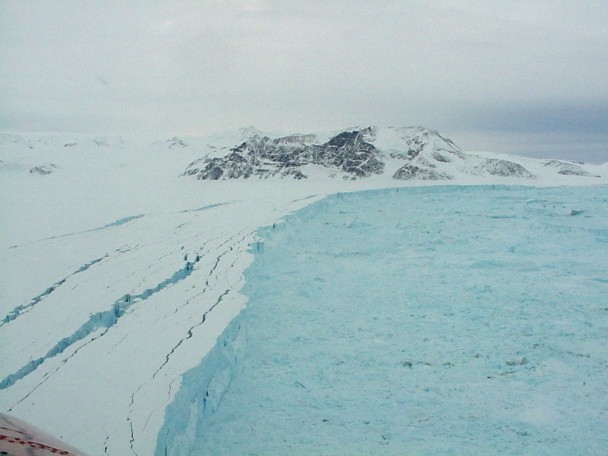
In an address to Coast Guard graduates, President Obama on Wednesday made his strongest statements yet about the impact of climate change not only on our ability to survive as a species but on the threat it poses to national security:
“I am here today to say that climate change constitutes a serious threat to global security, an immediate risk to our national security, and make no mistake, it will impact how our military defends our country,” he said during the Coast Guard Academy’s graduation ceremony.
Speaking to cadets, who he said were already battling climate change, Obama said, “This is not just a problem for countries on the coast or for certain regions of the world. Climate change will impact every country on the planet. No nation is immune.” …
The Pentagon has called climate change “a threat multiplier,” making conflicts more difficult to confront.
Obama said Wednesday that this threat multiplier is not just about the future. The burdens of climate change, he said, are already felt by the U.S. national security apparatus.
He said that in Nigeria and Syria the effects of climate change have given radical groups space to capitalize on existing instability.
The President’s address is below the fold …
The President’s address:
From the president’s speech:
As a nation, we face many challenges, including the grave threat of terrorism. And as Americans, we will always do everything in our power to protect our country. Yet even as we meet threats like terrorism, we cannot, and we must not, ignore a peril that can affect generations.
Now, I know there are still some folks back in Washington who refuse to admit that climate change is real. And on a day like today, it’s hard to get too worried about it. There are folks who will equivocate. They’ll say, “You know, I’m not a scientist.” Well, I’m not either. But the best scientists in the world know that climate change is happening. Our analysts in the intelligence community know climate change is happening. Our military leaders — generals and admirals, active duty and retired — know it’s happening. Our homeland security professionals know it is happening. And our Coast Guard knows it’s happening.
The science is indisputable. The fossil fuels we burn release carbon dioxide, which traps heat. And the levels of carbon dioxide in the atmosphere are now higher than they have been in 800,000 years. The planet is getting warmer. Fourteen of the 15 hottest years on record have been in the past 15 years. Last year was the planet’s warmest year ever recorded.
Our scientists at NASA just reported that some of the sea ice around Antarctica is breaking up even faster than expected. The world’s glaciers are melting, pouring new water into the ocean. Over the past century, the world sea level rose by about eight inches. That was in the last century; by the end of this century, it’s projected to rise another one to four feet.
Climate change will directly impact the Coast Guard’s activities. In addition to causing rising sea levels and diminishing sea ice, which will literally change the shape of the Coast Guard’s purview, climate change is also behind increased extreme weather events and can contribute to political instability. […]
The same day as Obama’s speech, the White House released “The National Security Implications of a Changing Climate,” a collection of findings that outlines climate change’s impacts on national and international security, as well as the new demands it puts on military resources. The report concludes:
Climate change is predicted to strain economies and societies around the world, placing an additional burden on already-vulnerable nations abroad and putting pressure on capacity at home. Climate change will change the nature of U.S. military missions, demand more resources in the Arctic and other coastal regions vulnerable to rising sea levels and other impacts, and require a multilateral response to the growing humanitarian crises that climate change is predicted to bring.
The Commander of the U.S. Pacific Forces has called climate change the biggest threat to the region’s security.
Republicans reacted with dismay because “fighting climate change” does not require bombers and fighter jets and bazookas and guns. Instead it requires a commitment to clean energy and ending our reliance on fossil fuels which have been part of the problem of national and international security for decades.
It is too bad that no one cared enough in the 1970s, after gas prices stabilized following the OPEC-induced price spike, to continue working towards finding an alternative to fossil fuels. Instead, we kept drilling (and spilling!) and burning and now we are in one heck of a mess. In 1969, the Santa Barbara oil spill gave birth to the environmental movement. In 2015, another Santa Barbara oil spill gets a collective yawn.

President Obama to Coast Guard cadets:
From Santa Barbara:
Inexplicably??? Why is it inexplicable that a pipeline carrying a fuel would burst? And whose idea is it to run a pipeline along the coast of California, or any coastal area … or near water … or really, near any life forms?
Governor Inslee is committed to making some progress in Wa State, but even here change is slow…..
Inslee boosts climate goal as cap-and-trade action stalls